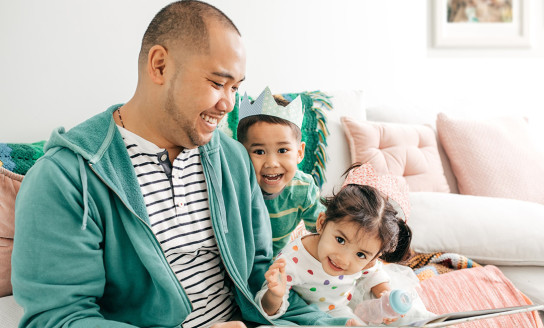A smoke-free environment is really important for children. Remember:
- more than 70 of the chemicals in cigarette smoke can cause cancer, and every cigarette you smoke harms nearly every organ and system in your own body
- children and babies can’t get away from smoke, and if you smoke where they are they breathe in those poisons too
- you’re their biggest role model. Young people with family/ whānau who smoke are more likely to start smoking themselves.
Talk to Plunket staff about how to stop smoking, call Quitline on 0800 778 778 or text 4006 for information.
About second-hand smoke
Second-hand smoke is a mix of smoke from the burning end of a cigarette and smoke blown into the air. Children breathe faster than adults and have smaller bodies, so they take in a higher dose of smoke than adults.
Second-hand smoke makes children sick. It flattens the little brushes that sweep and clean their airways. Dirt and germs build up, making it harder for a child to breathe.
A child from a house where someone smokes is more likely to develop illnesses like chest infections, asthma and glue ear. Babies of mothers who smoked in pregnancy have an increased risk of Sudden Unexpected Infant Death (SUDI), and so do babies who breathe in smoke.
Read more about second-hand smoke and how it affects children
About third-hand smoke
Third-hand smoke is what stays around when the cigarette is finished. This builds up layer by layer over time.
These layers of poisons are thicker in small spaces, like cars, than in large spaces. They build up on the surfaces of carpets, furniture and toys, and the skin of people and pets.
Steps to making your home and car smoke-free
Opening or winding down a window won’t remove all of the poisons, which stay long after the smoke and smell have disappeared. Here are some steps to making your home and car smoke-free:
- decide to have a smoke-free home and car - the government is moving to ban smoking in cars
- ask your family and others to support you
- get rid of all the ashtrays and lighters from your home and your car
- let other people know (put Smokefree/Auahi Kore stickers on your doors and windows).
While smoking outside is better than smoking inside, a smoke-free family is the best protection of all.
Smokefree homes and cars
Breastfeeding and smoking
Breastfeeding is still the best option for your baby, even if you smoke. Here’s how to protect your baby from second-hand smoke.
- Always smoke outside.
- Make sure other people smoke well away from you and your baby.
- Avoid smoking for an hour before you breastfeed.
- Smoke stays on your clothes, hair and skin, so when you’re smoking, cover your hair and clothes with something your baby won’t come into contact with.
- Always wash your hands and brush your teeth after you smoke.
How to quit smoking
It’s never too late to quit for your child, your whānau and for yourself. There are lots of ways to get support for you to quit, including access to nicotine patches, gum or lozenges to ease the cravings and help you get and stay smoke-free.
Your Plunket nurse will talk to you about smoking during your visits, and this could be a good time to reach out for support to quit smoking.
Talk to your Plunket nurse, health worker, call Quitline on 0800 778 778 or visit Stop smoking for help to quit.
